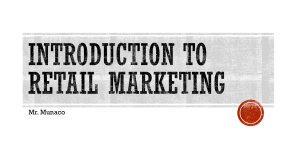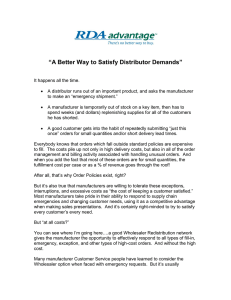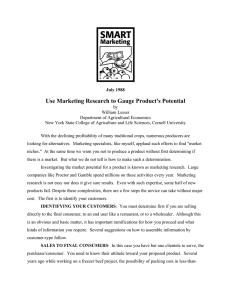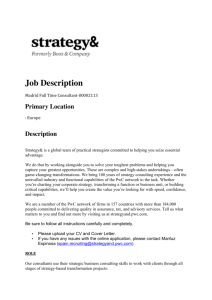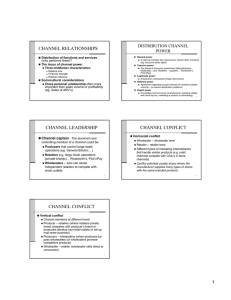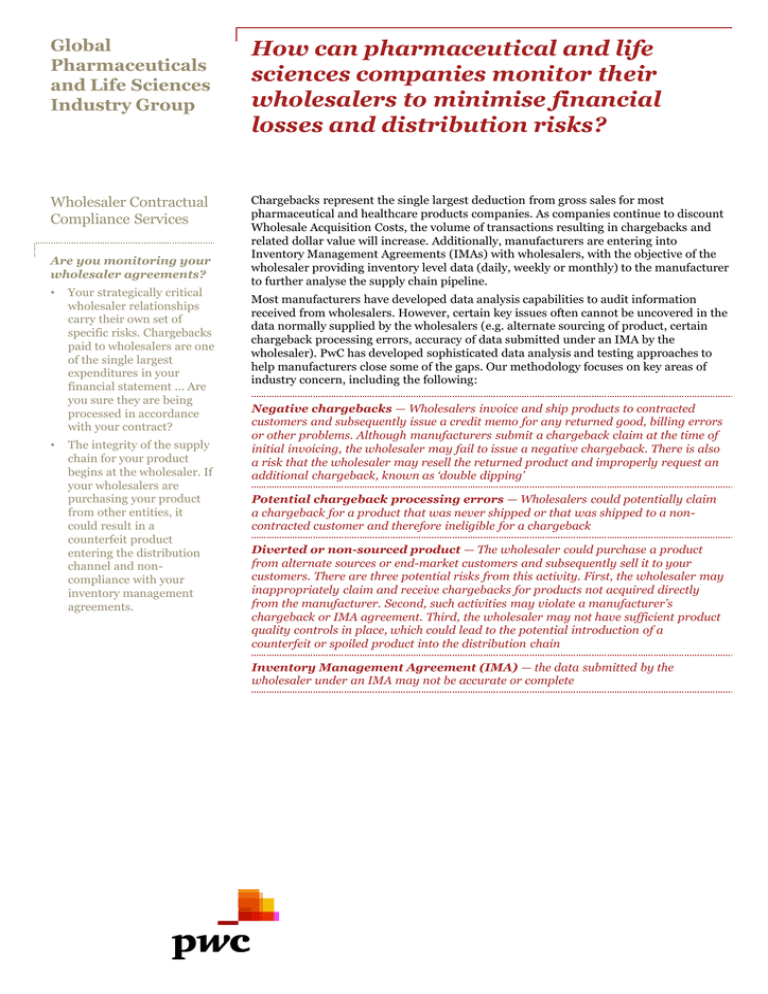
Global
Pharmaceuticals
and Life Sciences
Industry Group
How can pharmaceutical and life
sciences companies monitor their
wholesalers to minimise financial
losses and distribution risks?
Wholesaler Contractual
Compliance Services
Chargebacks represent the single largest deduction from gross sales for most
pharmaceutical and healthcare products companies. As companies continue to discount
Wholesale Acquisition Costs, the volume of transactions resulting in chargebacks and
related dollar value will increase. Additionally, manufacturers are entering into
Inventory Management Agreements (IMAs) with wholesalers, with the objective of the
wholesaler providing inventory level data (daily, weekly or monthly) to the manufacturer
to further analyse the supply chain pipeline.
Are you monitoring your
wholesaler agreements?
•
•
Your strategically critical
wholesaler relationships
carry their own set of
specific risks. Chargebacks
paid to wholesalers are one
of the single largest
expenditures in your
financial statement ... Are
you sure they are being
processed in accordance
with your contract?
The integrity of the supply
chain for your product
begins at the wholesaler. If
your wholesalers are
purchasing your product
from other entities, it
could result in a
counterfeit product
entering the distribution
channel and noncompliance with your
inventory management
agreements.
Most manufacturers have developed data analysis capabilities to audit information
received from wholesalers. However, certain key issues often cannot be uncovered in the
data normally supplied by the wholesalers (e.g. alternate sourcing of product, certain
chargeback processing errors, accuracy of data submitted under an IMA by the
wholesaler). PwC has developed sophisticated data analysis and testing approaches to
help manufacturers close some of the gaps. Our methodology focuses on key areas of
industry concern, including the following:
Negative chargebacks — Wholesalers invoice and ship products to contracted
customers and subsequently issue a credit memo for any returned good, billing errors
or other problems. Although manufacturers submit a chargeback claim at the time of
initial invoicing, the wholesaler may fail to issue a negative chargeback. There is also
a risk that the wholesaler may resell the returned product and improperly request an
additional chargeback, known as ‘double dipping’
Potential chargeback processing errors — Wholesalers could potentially claim
a chargeback for a product that was never shipped or that was shipped to a noncontracted customer and therefore ineligible for a chargeback
Diverted or non-sourced product — The wholesaler could purchase a product
from alternate sources or end-market customers and subsequently sell it to your
customers. There are three potential risks from this activity. First, the wholesaler may
inappropriately claim and receive chargebacks for products not acquired directly
from the manufacturer. Second, such activities may violate a manufacturer’s
chargeback or IMA agreement. Third, the wholesaler may not have sufficient product
quality controls in place, which could lead to the potential introduction of a
counterfeit or spoiled product into the distribution chain
Inventory Management Agreement (IMA) — the data submitted by the
wholesaler under an IMA may not be accurate or complete
Contacts
Tony Farino
Partner
anthony.farino@us.pwc.com
+1 312 298 2631
How can PwC help your organisation?
Using PwC’ extensive knowledge of the pharmaceutical industry supply chain along with
our sophisticated data analysis programmes developed to identify anomalies in
wholesaler information, our state-of-the-art methodology is designed to:
Peter Claude
Assess potential wholesaler mis-statements
Partner
peter.claude@us.pwc.com
+1 973 236 4289
Test wholesaler chargeback claims and analyse transaction details using data
unavailable to a manufacturer’s in-house audit team
Target specific high-risk areas such as negative chargebacks, diversion and invalid
chargebacks, through a combination of manual and automated data analysis
techniques applied to wholesaler information
Provide remediation recommendations to the wholesalers and the manufacturer for
resolution of issues that resulted in mischarges to the manufacturer
Provide manufacturers with contract improvement and oversight process
recommendations
Benefits you can realise
Identification of potential overpayments
Greater confidence in chargeback reserves and payments
Greater confidence in your product distribution chain’s integrity
Improved contracting and contract administration procedures
Improvements to wholesaler monitoring with the implementation of additional
analytical procedures
www.pwc.com/pharma
This publication has been prepared for
general guidance on matters of interest
only, and does not constitute
professional advice. You should not act
upon the information contained in this
publication without obtaining specific
professional advice. No representation
or warranty (express or implied) is given
as to the accuracy or completeness of
the information contained in this
publication, and, to the extent permitted
by law, PwC does not accept or assume
any liability, responsibility or duty of care
for any consequences of you or anyone
else acting, or refraining to act, in
reliance on the information contained in
this publication or for any decision based
on it.
© 2015 PwC. All rights reserved. PwC
refers to the PwC network and/or one or
more of its member firms, each of which is
a separate legal entity. Please see
www.pwc.com/structure for further details.
150213-145024-SS-OS
Global Pharmaceutical and Life Sciences Industry Group
The Global Pharmaceutical and Life Sciences Industry Group at PwC is dedicated to
delivering effective solutions to the complex business challenges facing pharmaceutical
and life sciences companies. A global leader in serving the pharmaceutical and life
sciences industry PwC has extensive experience working with companies on industryspecific strategic, operational, and financial issues. Our expertise includes assurance, tax
and advisory services, as well as specialised capabilities in regulatory compliance, risk
management, performance improvement and transaction support. In helping our clients,
we draw on the full knowledge and skills of PwC’s professionals. More than 195,000
people in 157 countries connect their thinking, experience and solutions to build public
trust and enhance value for clients and their stakeholders.

